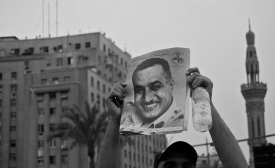revolution
As Syrians continue to flee the conflict that rages in their home country, many via war-torn Libya, or Tunisia, which is struggling to keep its youth from joining ISIS, it's all too clear that the effects of the uprisings that swept the southern Mediterranean belt in 2011 are ongoing. Yet already there is talk of more on the horizon.

CPD University Fellow Laurie Brand considers the evolution of Middle Eastern nation branding with a focus on Algeria and Egypt.
The United States discreetly supported the creation of a website and SMS service that was, basically, a Cuban version of Twitter, the Associated Press reported Thursday. ZunZuneo, as it was called, permitted Cubans to broadcast short text messages to each other. At its peak, ZunZuneo had 40,000 users.
Civil strife often follows a grimly predictable pattern. What at first seems a soluble dispute hardens into conflict, as goals become more radical, bitterness accumulates and the chance to broker a compromise is lost. Such has been the awful trajectory of Ukraine, where protests that began peacefully in November have combusted in grotesque violence.
Three months after the first anti-government protests in Ukraine, the country has experienced its deadliest day of political violence, with nine people dying in clashes between demonstrators and police. The beating heart of the pro-Europe, anti-Russia 'Euromaidan' movement is in Kiev's Independence Square (in Ukrainian, Maidan Nezalezhnosti), and the square is currently in flames after a day of police firing rubber bullets at protesters wielding molotov cocktails and fireworks.
The optimism of the Arab Spring seems to have evaporated in the past three years. Just look at Syria and its brutal civil war. Or Egypt, where the third anniversary of the revolution was marked by more violence, and where a new military strong man seems to be gaining the upper hand. But then there's Tunisia, the nation where the Arab Spring began.
Last November, senior government officials held a ceremony in Egypt’s Tahrir Square, unveiling a monument to the revolution’s martyrs. The monument was simple, though its significance was not. It consisted of a stone pedestal on a circular base in the center of Tahrir Square. A military band played. At a brief unveiling ceremony that morning, Egypt’s interim Prime Minister Hazem el-Beblawi said it was meant to honor “the martyrs of the January 25 and June 30 revolutions.”
Egypt’s deposed government filed a complaint to the International Criminal Court (ICC), requesting investigations into what it described as crimes committed by the military against its members. The complaint accused the military of staging a coup d’etat against the country’s first elected president Mohamed Morsi and his government, which was followed by the detention of its members and the usage of “extreme force to remove civilians who gathered to protest against the coup."







